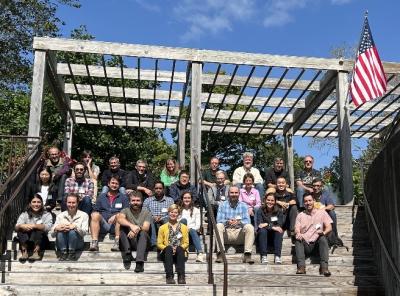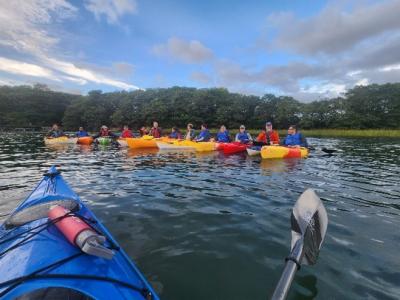Permafrost Modelers Gather at Cape Cod for Intercomparison Workshop
As summer turned to fall this year, 28 permafrost modeling experts and associated researchers converged at the Woodwell Climate Research Center in Falmouth, Massachusetts.
The scientists—from 15 organizations and seven countries across North America and Europe—were at the Cape Cod research center September 26-28 for the Warming Permafrost MIP (WrPMIP) - Site-Level Benchmarking Workshop.
Workshop lead Christina Schaedel says the three-day event featured plenary and breakout sessions focusing on the challenges and pathways for models to include permafrost processes and how experimental data from warming experiments can be used to constrain model output.
The workshop centered on the Warming Permafrost Model Intercomparison Project (WrPMIP), with overarching emphases that included:
- ‘big picture’ permafrost modeling
- regional simulations and benchmarking
- site-level simulations
Funded by the U.S. Department of Energy (DOE), WrPMIP works to improve permafrost representation in state-of-the-art carbon cycle models using site-level, observationally-based benchmarks. Using permafrost warming data, WrPMIP researchers use a standard simulation protocol across all participating models and benchmarking model outputs.
A senior scientist at Woodwell, Schaedel is also a principal investigator for the Regional & Global Modeling Analysis (RGMA) project, Coupling Model Intercomparison with Synthesized Experimental Data Across Time and Space to Constrain Carbon Dynamics and Biogeochemical Cycling in Permafrost Ecosystems.
RGMA is a program area within DOE’s Earth and Environmental Systems Modeling program.
“The workshop focused on the needs and challenges of permafrost modeling and the most efficient way of setting up site-level simulations representing warming experiments in the permafrost region,” said Schaedel. “Permanently frozen ground, or permafrost, is a critical component of Earth’s climate system, yet many earth system models do not adequately represent permafrost processes.”
The workshop aimed to contribute to the WrPMIP goals, including:
- synthesizing pan‐Arctic experimental warming studies
- performing multi-model site‐level simulations that align with experimental perturbation approaches to assessing coherence among models
- evaluating model performance against benchmarks
- informing future measurements
- assessing implications of benchmarking for pan‐Arctic upscaling and forecasts.
Schaedel says the workshop focused on the state of permafrost modeling, individual model capabilities, and priorities regarding permafrost modeling. “We discussed challenges and paths forward to improve permafrost processes in models,” she said. “The group identified priorities, such as the WrPMIP model intercomparison exercise, data gaps, and enhanced collaboration among modeling and observational communities.”
Additionally, initial results from the Arctic flux database were discussed, along with how data can be integrated with regional gridded simulations of air and soil warming simulations performed in the permafrost region. Modeling teams submitted initial warming simulations ahead of the workshop.
Finally, participants formed plans for future site-level simulations and discussed a standardized protocol, a variable output list, climate data needs for individual sites, and timelines.
The workshop was funded by DOE’s RGMA program area and organized by the WrPMIP team (Schaedel, William Riley of Lawrence Berkeley National Laboratory, and Northern Arizona University’s Jon Wells and Deborah Huntzinger) with organizational support from Woodwell’s Permafrost Pathways project.
For more information, contact Schaedel.


